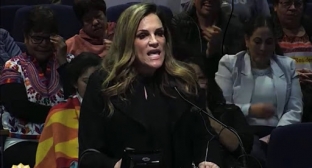 By Jesse Kendrick
By Jesse Kendrick
Image: Restore San Diego founder Amy Reichert
August 23, 2025 (El Cajon) – “State-sponsored kidnapping loophole” is the epithet lobbed at Assembly Bill 495 by local “Restore San Diego” newsletter.
The bill, officially entitled AB 495: Family Preparedness Plan Act of 2025, outlines a series of revisions to existing laws surrounding parental rights and legal guardianship proceedings. Specifically, lawmakers seek to widen the class of persons eligible to file a Caregiver’s Authorization Affidavit, to establish temporary guardianship protocols, and to institute immigration-related protections in public schools. The introduction of the bill states that these measures have become necessary to protect children and provide continuity of care in circumstances where parents may be abruptly deported or detained by immigration enforcement officials.
Existing law provides for a Caregiver’s Authorization Affidavit, a legal document which allows a related adult, such as a grandparent, to assume medical and education-related authority over a child in their household. Notably, this gives the caregiver the same power over medical and dental care that parents have. The document also shields the caregiver from liability when exercising these rights.
Introduced by Democratic Assemblywoman Celeste Rodriguez, AB 495 expands the eligibility of caretakers for the purposes of the affidavit, allowing “non-related extended family members” to authorize school-related medical care for a child. The term “non-related extended family member” (NREFM) is legally defined and somewhat deceptively broad, including any adult with an “established familial or mentoring relationship with a child.” According to the California Department of Social Services, this could include a godparent, a teacher, or a neighbor.
Ostensibly, this is the passage of the bill with which the author of “Restore San Diego” takes umbrage. The newsletter asserts that under AB 495, “any non-related adult—a neighbor, teacher, ex-relative, or even a complete stranger—could take guardianship of your child without your knowledge or consent.” The newsletter goes on to claim that the process requires “No background check. No court order. No parent’s signature. Just a piece of paper.”
These assertions are misleading, as they rely upon multiple fundamentally false premises. The newsletter claims that “any non-related adult” including a “complete stranger” could take “guardianship” of a child. This characterization is patently false, per the procedural definition of a non-related extended family member. The California Department of Social Services outlines a rigorous vetting process in determining the prerequisite “familial or mentoring relationship”:
“The county welfare department shall verify the existence of a relationship through interviews with the parent and child or with one or more third parties. The third parties may include relatives of the child, teachers, medical professionals, clergy, neighbors and family friends.”
Further, the claim that this enables assumption of “guardianship” is not just misleading; it’s factually incorrect. “Guardianship” is a legally defined term granting full parental rights to another party, greatly exceeding the rights granted to a mere caretaker. Importantly, guardianship requires a court order. While this bill does establish additional provisions for temporary guardianship, that too requires a court order.
Finally, the newsletter claims that these measures could be taken without parental consent. This is somewhat true, but highly misleading as stated. These provisions are designed to be carried out when a parent or guardian cannot be located, such as when deported or subject to indefinite detention. In such cases, it is impossible for a parent to provide consent. Nevertheless, every effort is made to ensure that parental wishes are followed. In fact, the bill mandates schools to “first exhaust any parental instruction relating to the child’s care found in the child’s emergency contact information.”
Additional safeguards are in place. Firstly, the affidavit is signed under penalty of perjury. Secondly, even if a bad actor decides to expose themselves to civil and criminal penalties by perjuring themselves on the affidavit, the law still explicitly provides that they cannot override parents:
“The decision of a caregiver to consent to or to refuse medical or dental care for a minor shall be superseded by any contravening decision of the parent or other person having legal custody of the minor, provided the decision of the parent or other person having legal custody of the minor does not jeopardize the life, health, or safety of the minor.”
 Image, right: Amy Reichert, at a January El Cajon City Council Meeting, met with derisive laughter from the audience as she claimed, “Yes, Jesus sought asylum—legal asylum!”
Image, right: Amy Reichert, at a January El Cajon City Council Meeting, met with derisive laughter from the audience as she claimed, “Yes, Jesus sought asylum—legal asylum!”
Reichert also garnered notoriety at an El Cajon City Council meeting in January. When immigrant rights advocates drew comparisons between modern asylum seekers and the flight of Jesus of Nazareth to Egypt, Reichert retorted: “Yes, Jesus sought asylum—legal asylum!” This provoked derisive laughter from the largely pro-immigrant crowd.
Reichert’s newsletter ended with a call to action, asking readers to protest the bill in Sacramento on August 19. Several hundred protesters showed up at the state capitol.
AB 495 passed in the Assembly in June and was referred to the Senate Appropriations Committee in early July. The bill requires a majority vote in the Democrat-dominated upper chamber before it becomes law.
The office of Assemblywoman Celeste Rodriguez, author of AB 495, did not respond to a request for comment.
 Image, left: Screenshot of the Restore San Diego Newsletter
Image, left: Screenshot of the Restore San Diego Newsletter
